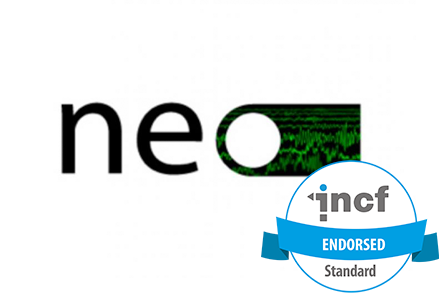
INCF endorses Neo as a standard
26 October 2022On October 25, the INCF SBP committee voted to endorse Neo as a standard, with standard number INCFSN-22-02.
Neo is an object model for handling electrophysiology data in multiple formats. It is suitable for representing data acquired from electroencephalographic, intracellular, or extracellular recordings, or generated from simulations. Neo has been implemented as a Python package for working with electrophysiology data, together with support for reading a wide range of neurophysiology file formats (including Spike2, NeuroExplorer, AlphaOmega, Axon, Blackrock, Plexon, Tdt, Igor Pro), and support for writing to a subset of these formats plus non-proprietary formats including Kwik and HDF5.
In the community review of Neo, commenters from many different perspectives (experimentalists, modelers and tool builders) expressed support for endorsing Neo, and highlighted Neo’s importance for their own research.
Endorsement of community standards, like Neo, is a key pillar in INCF’s mission to make neuroscience more open and FAIR. Quality community standards ensure that research funds and efforts are well invested and that scientific findings are robust and replicable, but many neuroscience communities lack robust standards or have competing incompatible standards. The rapid development of new techniques also means that there is a continuous need for new and updated standards, and that old standards need an active developer and user community keeping them up to date.
By endorsing standards, INCF wants to
- Make it easy to find the best, most reliable standard appropriate for your research
- Ensure recognition for community members investing their time and effort in standards
Read more about the endorsement process: https://www.incf.org/activities/endorse
Read more about Neo:
Neo documentation: https://neo.readthedocs.io/en/latest/
INCF SBP committee review of Neo: https://f1000research.com/documents/11-658
Publications: Publications citing Neo

